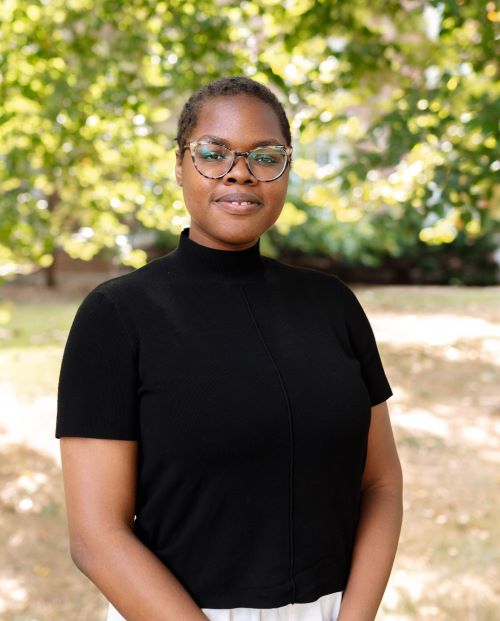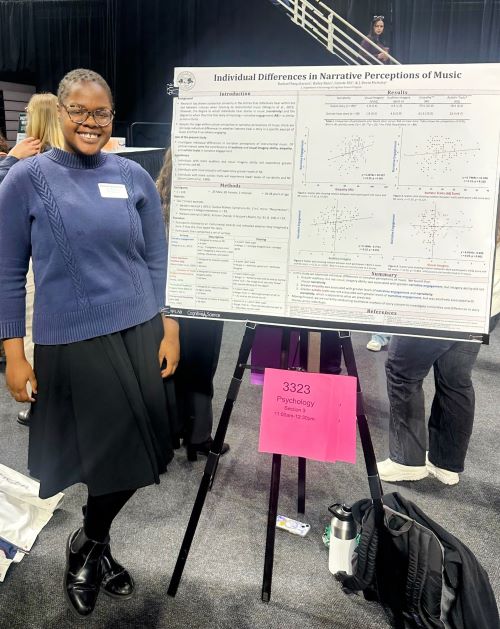PSY Student Research Spotlight with Rachael Farquharson
April 21, 2025 - Shelly DeJong
 Rachael Farquharson is a sophomore with double majors in a Bachelor of Science in Psychology and a Bachelor of Arts in Music. Rachael is a vocalist and is in several choirs including State Singers and Mosaic.
Rachael Farquharson is a sophomore with double majors in a Bachelor of Science in Psychology and a Bachelor of Arts in Music. Rachael is a vocalist and is in several choirs including State Singers and Mosaic.
She recently received a Dean’s Assistantship Award which allows her to continue her research with Dr. Devin McAuley’s Timing, Attention, and Perception (TAP) Lab. We met with Rachael recently where she shared about her research, what it means to receive the award, and who has helped her along the way.
Your double major seems like a perfect fit for the TAP Lab. Is that why you were originally drawn to the lab?
Yeah! I was initially interested in the TAP Lab because it combines my interest in psychology and my interest in music. Initially, I started working on a tapping project but this semester I started working on a narrative listening project, which I was originally drawn to!
Tell me about your work with the narrative listening project.
In this project, we present participants with a five-minute excerpt of classical music. After listening, they are asked whether they imagined a story while engaged with the music. If they respond "yes," they then write out the story they imagined. We are considering which traits may influence two main aspects: whether someone imagines a story and how engaging they find that story.
After they listen to the to the music, the participants complete a series of surveys. The first is a narrative engagement survey, which gauges how stimulating and interesting the imagined story was. It measures things like if the story was vivid and ease of imagining a story. They also fill out the Autism Spectrum Quotient, which measures the presence of autistic-like traits because there is research suggesting that some individuals with autism may experience challenges with the ability to understand and identify the perspectives of others. If someone struggles with this ability, they might have difficulty connecting with a story because they cannot see it from the characters' perspectives.
Next, participants complete the Vividness of Visual Imagery Questionnaire. This questionnaire presents a scenario, such as picturing a sunset, and asks about the vividness of certain aspects such as colors and details like the presence of trees in the background, which they rate on a scale. The fourth survey is an auditory imagery scale, called The Bucknell Auditory Imagery Scale, which is similar to the visual imagery survey but focuses on sounds. For example, participants might be asked to imagine a birthday party and rate how clearly they can hear the sound of people singing "Happy Birthday."
Finally, the last survey is the Interpersonal Reactivity Index, which measures how empathetic participants perceive themselves to be. We measure this because the idea is that if a person is empathetic, they may be more likely to connect with a story they imagine from the music. When they hear the narrative, it might evoke strong emotions.

I had a few hypotheses comparing how scores on empathy, autistic traits, and their auditory and visual imagery would impact their narrative perceptions. I examined correlations, made scatter plots and compared mean scores between participants who imagined a story and those who did not to see if there was a significant difference.
I found that greater auditory imagery ability (but not visual) was linked to higher narrative engagement. While auditory imagery didn’t affect whether a story was imagined, it did enhance feelings of stimulation and connection when a story was imagined. We also discovered that greater empathy correlates with higher levels of narrative engagement and narrativity. In contrast, autistic traits showed no correlation with narrative engagement, although they were positively associated with "narrativity," which was unexpected given the theory of mind concepts.
We plan to categorize the narratives participants created, noting different narrative styles and levels of completeness. We might also explore additional scales designed to measure the same individual differences to see how they impact our findings.
Can you share more about the different narratives that you’ve seen so far?
When it comes to narratives, people can experience them in various ways. Some may envision a rich, detailed storyline with multiple characters and events, while others might imagine a static image or not visualize anything at all. Additionally, there are different types of narratives to consider. For example, an autobiographical narrative might involve reflecting on a personal experience, such as a song reminding someone of reading at the library when they were younger. On the other hand, an original narrative could be a story invented entirely by the individual. We also commonly encounter referential narratives, where individuals reference well-known franchises like Disney, Star Wars, or Tom and Jerry (which comes up a lot!).
Why is it important to you to study this?
This topic is significant to me because I have a strong tendency to imagine stories while listening to music and relate to those stories on an emotional level. This inclination seems to be a natural part of my personality, and it’s also something I’m expected to do as a music student. I’m interested in understanding how this experience differs for others, especially since I know not everyone perceives music in the same way. While I have a unique perspective as a music student, I’m curious about how casual listeners experience music.
Congratulations on receiving a Dean's Assistantship. What does it mean to you to receive that?
I'm very happy about it. I’m pleased because I get to continue working in the lab and its nice recognition for the work that I’m doing. It’s nice to see that people outside the lab are also interested in seeing me continue my work.
Would you like to give a shoutout to anyone who's kind of helped you in your journey?
I would like to give a shoutout to Dr. McAuley, Bailey Rann, and Celeste Uhl. They’ve been so supportive of me during my time with the lab and helped me get my Dean’s Assistantship. I look to Bailey and Celeste a lot for support and advice, and they’ve been great with that.

